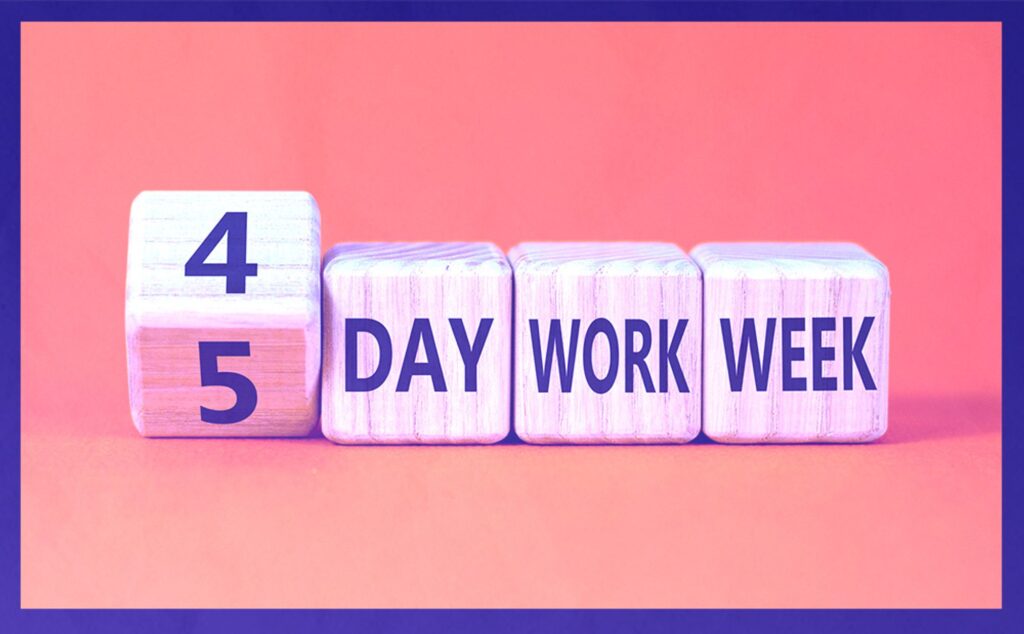
When choosing between working more and working less, the second option will win first prize every time. Most people don’t have that choice. But more and more companies are looking at the possibilities of a four-day work week.
Why? Well, it turns out that people may not only live healthier, happier lives working one less day out of seven, but they also work with more efficiency. Win, win! And the third win lies in better sleep.
Sleepopolis did a survey asking people about four-day work weeks and over half said they sleep up to two hours more on nights with no work the next day. More than 80 percent said they would be happy if their workplace switched to a four-day schedule, and you may be in this majority.
Studies show that long working hours up your risk for various health problems, including: (1)
- Heart disease
- Chronic fatigue
- Stress
- Depression
- Anxiety
- Poor sleep
People who work too much are also much more likely to overdo it on the alcohol, smoke, and skip exercising. (1) While that may sound like your perfect day, your body doesn’t love it!
With the extra sleep that comes with four-day work weeks, the schedule might seem like a no-brainer! Just to make sure, we dug into the research and talked with some experts and employees about their experiences trying out the new schedule.
A Lot to Love About 4-Day Work Weeks
Okay, so we know what long working hours do to our health, but what does the research say about the health benefits of working four days vs. five or more? One large study review found that people who worked four days a week reported: (2)
- Less mental fatigue
- Better sleep
- More time for social activities with family and friends
- Improved heart and lung function
- Fewer aches and pains
- Improved gastrointestinal issues
- Lower stress levels
- Better memory
- More energy after work
Yikes, that’s a pretty exciting list! When Sleepopolis asked both employers and employees what they thought about four-day work weeks, their answers were all in the good news category.
Higher Productivity
Quierra Winter Rodriguez, RN, MSN-Ed, a managed care nurse, says four day work weeks helped her staff work more efficiently. “I saw a spike in productivity that lasted several months,” Rodriguez says. The research agrees: when allowed to work four days, employees increased their productivity to get the same amount done in less time. (2)
Quality Over Quantity
Gareth Hoyle, Director at Marketing Signals, transitioned his team to a four-day work week in May 2022 and so far, he says it’s been a resounding success. “Sometimes less is more, and this is certainly true for a four-day week,” Hoyle says.
He attributes this success to the focus on quality over quantity and believes this will revolutionize the future of work. Hoyle says he has always measured results over time spent on projects, and the four-day work week has proven the merits of this metric.
Better Work/Life Balance
Experts say long working hours closely link to poor work-life balance and more family conflict over work. (2)
“When I worked five days, I constantly felt burnt out — much, I think, like the majority of 9–5ers,” says Alice Lang, Senior Digital PR Executive at Marketing Signals. “I worked hard all day, packed workouts, cooking, and some socializing into my evenings and would be completely knackered by Friday.”
Four-day work weeks have rebalanced Lang’s work and non-work life. Her boss, Hoyle, agrees: “Ultimately, I believe that a good work/life balance is the key to a happy and healthy workforce, which leads to loyalty and ultimately helps the business grow.”
How 4-Day Work Weeks Help Your Sleep
Four day-work weeks seem to be pretty well loved and research shows all kinds of health benefits. But what about sleep? Over 60 percent of people who answered Sleepopolis’s survey said they would use the extra time from a four-day work week to catch up on sleep.
Studies have shown those surveyed are not alone. In one large study review, people who worked four days vs. five complained less about insomnia, woke up more refreshed, felt less sleepy on their off hours, and felt more satisfied at work. (2)
The researchers also found people reported more hours of sleep, less stress, better memory, more positive emotions, and less exhaustion than those who worked five days a week. (2)
But how do work hours affect sleep?
Improved Mental Health
You’ve probably experienced lying down to drift off to dreamland, but suddenly your brain bombards you with all the things you forgot to do, or all the stresses in your life. Across the board, our experts said a four-day work week made for a lot less stress.
Shelby House, RN BSN worked four days a week as a cardiopulmonary rehabilitation nurse and said her anxiety plummeted when she worked less than five days a week, which helped her sleep much better.
“When I’m stressed, I struggle to sleep. So now, less stress simply means better sleep,” says Lang.
The research agrees: when work hours are reduced, people feel less worried and stressed at bedtime, and their sleep quality improves. (2)
“A four-day work week could help us better manage stress as well as be generally less stressed due to more personal time, making it more likely we get enough quality sleep on a regular schedule,” says Jeff Kahn, sleep expert and researcher with Rise Science.
Better Time Management
“I think sleep used to be something I’d cut back on in order to gain more time,” says Lang, who adds she would often stay up later just to get some time to herself. Lang says with her four-day work week, she has more time to get things done, like cooking, cleaning, working out, and socializing.
Where she used to cram these things into her after-work time, she can now spread them out, slowing down her evenings and getting to bed earlier.
More Sleep-Friendly Activities
An extra weekend day gives people more time to get outdoors in natural light, which is a huge help to quality sleep, says Kahn. “[It] could make more time…to socialize, more time to move and be active, all of which have been shown to improve our sleep health and overall wellbeing.”
Extra Day to Catch Up on Sleep
When you skimp on sleep, you go into sleep debt — which you can pay off by getting more sleep another night. (3) An extra day off can provide a perfect opportunity to pay this debt down.
“A three-day weekend could provide an additional day to strategically catch up on sleep lost during the work week… This can help keep sleep debt low, improving energy and health if managed wisely,” says Kahn.
4-Day Work Week Downsides
This seems to be a lot of good news for four-day work weeks. But does this schedule have any downsides? Kahn says maybe.
Longer Workdays
If weekly hours aren’t cut, but redistributed, the sleep benefit may not come as easily. “The potential for extended working hours on the now four working days could reduce work-week sleep time even further, contributing to sleep debt and potential sleep disorders,” Kahn says.
Social Jet Lag
One important aspect of good sleep health and hygiene is to keep the same sleep schedule every day — whether you work or don’t. (4) When you have two different sleep schedules for work and play, you can have “social jetlag,” says Kahn, which can hurt your sleep and energy levels.
More Sleep-Challenging Activities
“With one extra ‘weekend’ night, the temptation to engage in sleep-challenging activities like late meals and late alcohol drinking could negatively impact sleep,” says Kahn, which can lead to higher sleep debt and disturb your circadian rhythm, or internal clock.
Your circadian rhythm, or internal clock, helps your body figure out when it’s time to be awake and time to get sleepy. If you change up your sleep schedule too often, your body can’t figure out its rhythm, and your sleep can take a hit. (5)
You Can Get Great Sleep on Any Work Schedule
While four-day work weeks sound like an incredible goal, they’re just not possible for everyone. (We see you, teachers!) The good news? You can get better sleep no matter your work schedule.
For your best sleep, Kahn recommends these tips:
- Have a consistent sleep schedule: Even on off days, try to go to bed and wake up around the same time to keep the body’s internal clock consistent (within an hour or so).
- Keep naps short: To further catch up on sleep, opt for short afternoon naps rather than long sleep sessions that can disrupt nighttime sleep.
- Light bedtime snacking only: Be mindful of activities like late-night eating or drinking, as they can push back your bedtime and make the sleep you do get less restorative.
- Use a bedtime routine: Still try to squeeze in a relaxing bedtime routine on longer work days. Even a 15-30 minute “buffer” between work and sleep can help your mind and body transition to more restful sleep.
- Follow good sleep hygiene: Good sleep hygiene includes making your sleep space cozy, dark, and comfortable and avoiding blue light (from electronics) before bed.
Following these guidelines can help your sleep quality reach its peak whether you have work the next day or not. But you can also go ahead and give your supervisor a little nudge… maybe they’d like a four-day work week, too!
Sources
1. Wong K, Chan AHS, Ngan SC. The Effect of Long Working Hours and Overtime on Occupational Health: A Meta-Analysis of Evidence from 1998 to 2018. International Journal of Environmental Research and Public Health. 2019;16(12):2102. doi:10.3390/ijerph16122102
2. Voglino G, Savatteri A, Gualano MR, et al. How the reduction of working hours could influence health outcomes: a systematic review of published studies. BMJ Open. 2022;12(4):e051131. doi:10.1136/bmjopen-2021-051131
3. Guzzetti JR, Banks S. Dynamics of recovery sleep from chronic sleep restriction. SLEEP Advances. 2023;4(1):zpac044. doi:10.1093/sleepadvances/zpac044
4. Chaput JP, Dutil C, Featherstone R, et al. Sleep timing, sleep consistency, and health in adults: a systematic review. Appl Physiol Nutr Metab. 2020;45(10 (Suppl. 2)):S232-S247. doi:10.1139/apnm-2020-0032
5. Circadian Rhythms. Accessed January 6, 2024. https://www.nigms.nih.gov/education/fact-sheets/Pages/circadian-rhythms.aspx
Rodriguez, Quierra Winter. Author interview. January 26, 2024.
Hoyle, Gareth. Author interview. January 29, 2024.
Lang, Alice. Author interview. January 29, 2024.
House, Shelby. Autho interview. January 28, 2024.
Kahn, Jeff. Author interview. February 1, 2024.



























